
A prominent figure ...
Page 1
Amidst the Gaza war, Tehran’s unwavering support for Hamas and the Palestinian people was evident. Nevertheless, under Amir-Abdollahian’s adept leadership, Iran’s diplomatic apparatus tirelessly worked towards ending the conflict. Simultaneously, the Foreign Ministry remained vigilant against the schemes of Israeli and American extremists aiming to drag Iran into a direct war. Tehran’s strategic decision not to engage in direct confrontation was implemented with utmost prudence.
With a keen understanding of the power of diplomacy and the importance of coordinating military and diplomatic efforts, Amir-Abdollahian skillfully navigated the complex geopolitical landscape. This approach culminated in the most severe direct confrontation between Iran and Israel on April 14, which occurred with the full backing of the Ministry of Foreign Affairs.
In alignment with the government’s overarching policy of fostering relations with neighboring countries, Amir-Abdollahian achieved considerable success in the realm of foreign policy. The substantial attendance of high-ranking delegations from neighboring and regional countries at the funeral ceremony to pay their respects to the late president and foreign minister in Tehran serves as compelling evidence of these accomplishments.
Notable among these achievements was the restoration of diplomatic ties between Iran and Saudi Arabia following a prolonged period of estrangement. This landmark development exemplified Tehran’s policy of de-escalation and regional cooperation during Amir-Abdollahian’s tenure as foreign minister.
Approximately seven years after diplomatic relations between the two key players in the region and the Islamic world were severed, Amir-Abdollahian held a meeting with Saudi Crown Prince and Prime Minister Mohammed bin Salman in Jeddah in August 2022. This historic rapprochement brought numerous benefits not only to Tehran and Riyadh but to other regional countries as well. The resumption of political relations between Iran and Saudi Arabia, the cessation of hostilities between Yemen and Saudi Arabia, the normalization of Arab countries’ relations with Syria, and Damascus’ return to the Arab League after a multi-year absence are all testaments to the far-reaching impact of this diplomatic breakthrough.
Amir-Abdollahian’s tenure as foreign minister was characterized by significant progress towards restoring diplomatic relations between Iran and Egypt. Although he didn’t live to see the fruits of his efforts, the presence of Egyptian Foreign Minister Sameh Shukri at the funeral ceremony for the late president and foreign minister hints at promising developments in Tehran-Cairo relations in the near future.
The attendance of the Bahraini delegation, led by their foreign minister, at the ceremony should also not be overlooked. Bahrain followed Saudi Arabia in severing political ties with Tehran in 2016. Under Amir-Abdollahian’s diplomatic leadership, Iran also secured membership in key international agreements, such as the Shanghai Cooperation Organization and BRICS.
Hossein Amir-Abdollahian’s 30-year career in foreign policy solidifies his place among Iran’s distinguished luminaries in the field of diplomacy. His commitment to fostering regional cooperation and strategic alliances leaves a lasting legacy for Iran’s foreign policy.







